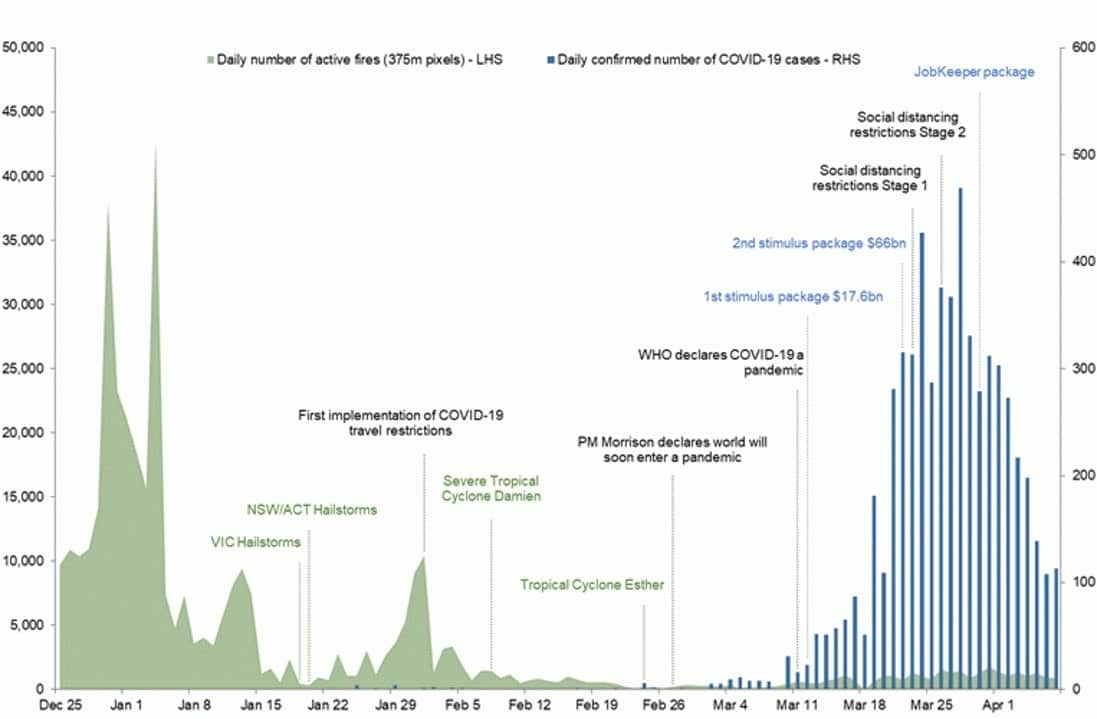Employment Matters
Opportunity For Everyone Through Employment And Inclusion

Key job statistics
What changed
in March-June 2020

Total number of employed persons decreased by 5.4% to 12.8 million
Total number of jobs decreased by 1,028,400 (or 7.0%)
Total number of hours actually worked decreased by 527.3 million hours (or 9.8%)
Underemployed persons increased by 31% rising to 1,698,200
Secondary jobs fell by 193,400 (or 19.6%)
Number of multiple job holders decreased by 22.7%
Source: Labour Account Australia June 2020 ABS
Total number of JobSeeker payment recipients increased by 648,473 (55%) to 1,441,287
Total number of Youth Allowance (other) recipients increased by 79,726 or 54%
Source: DSS Demographics June 2020

Unemployment Rate
A large proportion of people who left employment during the March to June quarter did not look for work and as such are not counted in the unemployment rate. People’s job search activity was influenced by COVID-19 and containment measures for example increased caring responsibility, fear of infection, lack of suitable vacancies. These people nevertheless may be receiving income support and want work now or in the near future.
Source: Flows into and out of employment and unemployment Jul 2020 ABS

Employment statistics
The key impacts on work
Approximately 920,000 organisations received JobKeeper Payment supporting around 3.5 million individuals.
Nationally, only 53% of businesses were operating at full capacity, By end of June 2020.
More than 2.6 million Australians accessed their superannuation early with $37.4 billion in total benefit payments between March and June 2020. This was an increase of 77.7% from the Jan – Mar 2020 quarter with the large increase reflecting the Early Release Scheme that commenced in April in response to the pandemic.
Between March and June 2020, the industries with the highest proportion of payroll job losses were: Accommodation and food services (20.3%) and Arts and recreation services (18.6%). These two industries also had sharp decreases in job vacancies (65.9% and 95.2%).
The youth unemployment rate (i.e. aged 15-24) increased from12.0% in February 2020 to 16.4% by end of June 2020.
Around 2.7 million people between March and April 2020, and around 2.3 million people between April and May 2020 – around 1 in 5 employed people – were affected by either job loss or working fewer hours than usual for economic reasons.
Job vacancies decreased 43.2%, or by 98,200 vacancies, in the three months to May 2020 (seasonally adjusted). A fall of this scale was unprecedented in the history of the Job Vacancy Survey. The largest single quarterly decline in the 1980s recession was 18.6% (in May 1982) with a decline of 26.7% in the 1990s recession (in November 1990).

Timeline of events
March Quarter 2020

Realising Our Vision
Highlights from the Year in Review
NESA delivers its vision through Voice and Support
Achievements in 2019-2020 that strongly supported improved business arrangements for NESA members included:
Successfully advocated for the separation of CTA funding from the Employment Fund
Continued advocacy saw the removal of Career Transition Assistance funding from the Employment Fund
Funding flexibilities and adjustments to support the sector through COVID-19
Identified and achieved necessary modifications and increased flexibilities to maximise existing funding arrangements to support providers throughout COVID-19, including advance payments across jobactive and DES
Maximum Time Transfers Suspended
Successfully advocated for the suspension of Maximum Time Transfers to avoid business share adjustments and provide some certainty and stability for the sector
Payment model adjustments during COVID-19 — CDP
NESA advocated for a stable payment model during COVID-19 for CDP services
Informing the Portable Long Service Authority
Considerations raised at a NESA led forum informed the Portable Long Service Authority’s guidelines
Leading advocacy on Bushfire Contingency arrangements
Throughout the Bushfire Contingency arrangements NESA worked with all key departments to address the financial and operational impacts across the sector
Responded to the COVID-19 Pandemic Senate Inquiry
NESA highlighted key impacts, experiences and concerns across the sector to the COVID-19 pandemic Senate Inquiry.
Necessary IT Report development
NESA’s IT Reference and Reports Working Group oversaw the development and introduction of key reports giving providers unprecedented visibility and data insights for DES and jobactive job seekers
Improved communications between the sector and the Departments
Advocated successfully for improved messaging between CEOs and key bureaucrats across the sector
Clearer communication to job seekers
Achieved improved and clearer communication to job seekers around Mutual Obligations and continued engagements with providers, particularly throughout the Bushfires and COVID-19
Frequent and immediate communications to members
Kept members informed on latest updates, announcements, changes and sector impacts as they occurred.
United collaboration with peak bodies to represent the sector
Worked collaboratively with the respective peak bodies to reinforce the operational and financial adversity of COVID-19 and recommend measures and interventions to protect the sector
Self-audit trial - DES
Advocated for the implementation of the Self-Audit Trial as part of the DES Assurance Program

What we achieved through
Member Support
Help desk calls/emails for policy support
Members gained policy insights and contributed to policy positions through their participation in NESA’s Leadership Forums, Special Interest Groups, Taskforces, Working Groups, Advisory Groups and regular topic focused/general member phone consultations.
Subscribers were kept regularly informed of sector news and policy development through NESA communications.
Sector Capacity building
NESA continued to support the sector to advance employment inclusion in 2019-20:
Sector leaders and frontline staff gained skills and knowledge through NESA’s professional development and coaching programs, workshops and webinars throughout the year.
Member representatives benefited from NESA events and forums
Employment services practitioners registered for the Practitioner Toolkit
